Feb 2022 1st edition
Feb 2022 1st edition Londekile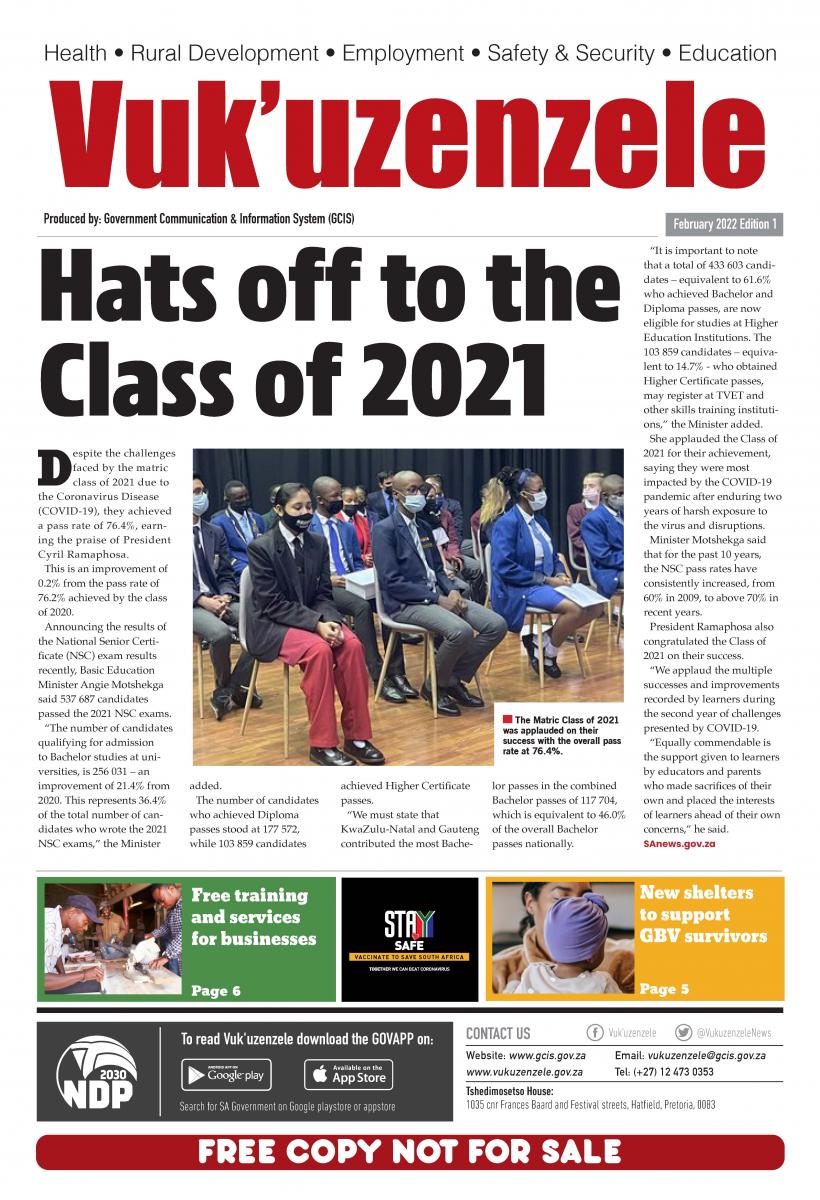
English PDF version
Translations
Afrikaans
isiNdebele
isiXhosa
isiZulu
Sepedi
Sesotho
Setswana
Siswati
Tshivenda
Xitsonga
Adults can further their education
Adults can further their education UrsulaAdults who are older than 21 and want to write the Senior Certificate (SC) exams in 2022 have until the end of January to register. 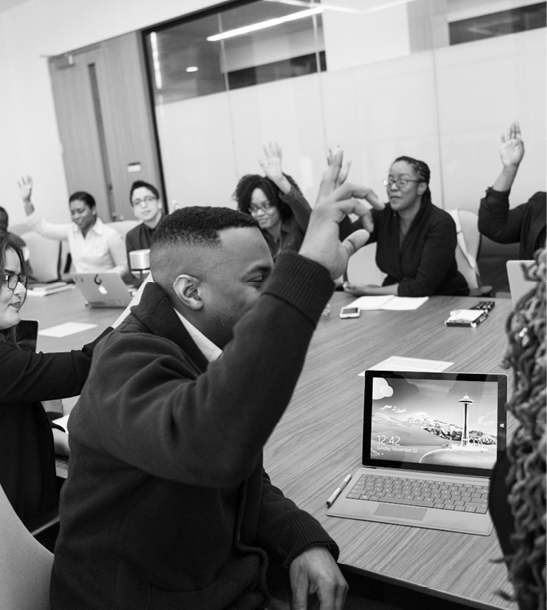
The Department of Basic Education (DBE) enables learners with incomplete National Senior Certificate (NSC) results, as well as adult learners who failed their matric exams or dropped out of school, to do a rewrite or study for an equivalent qualification.
Basic Education Minister Angie Motshekga says that the DBE had identified a need for a qualification for adults that is equivalent to the current NSC, so it introduced the SC.
“Curriculum and Assessment Policy Statement subjects will be offered as part of the SC qualification,” she says.
Those who pass the SC exams can qualify to attend university. “As in the case of the NSC exam, they can also qualify for admission to bachelor, diploma or higher certificate programmes at Higher Education institutions,” adds Minister Motshekga.
The following learners will qualify for admission to the SC:
Those who are 21 or older and have a General Education and Training Certificate, or a Grade 9 (previosuly Standard 7) school report stating that you have passed Grade 9 or Standard 7;
Those who have a recognised equivalent qualification obtained at a NQF level;
Adult learners with an incomplete SC or NSC qualification.
Candidates who are 21 years and older, with an incomplete NSC qualification, can choose to complete the NSC, or convert it to the SC. However, the DBE says that, should a candidate choose to convert to the SC, they may not revert to the NSC.
Candidates can write the SC in any of the 11 official languages. Subject choices include agriculture; business, commerce and management studies; human and social studies, mathematics, computer and life sciences.
Registration closes on 31 January 2022.
Candidates may register at any provincial education office, which includes the provincial head office, the district office or a circuit office, or on online at www.eservices.gov.za.
For more information visit the DBE website: www.education.gov.za and click on the curriculum tab.
Be careful of SARS eFiling scammers
Be careful of SARS eFiling scammers LondekileMembers of the public are warned to be vigilant of a new phishing scam that uses the name of the South African Revenue Service (SARS).
The scam targets taxpayers through phishing emails and text messages.
Phishing is the use of messages to trick a victim into revealing sensitive information. 
Phishing victims click on a link or open an attachment that seems to be from a reliable source - such as SARS or their bank - when, in fact, it often allows criminals to gain access to confidential information, such as passwords and usernames.
The SARS scam is aimed at accessing information from a taxpayer’s eFiling.
Once the scammers gain access to the eFiling profiles, they use the information to redirect tax refunds to their own bank accounts, rather than to the bank account of the intended recipient.
SARS Commissioner Edward Kieswetter says SARS is working around the clock to end this form of fraud.
“Let me leave no one in doubt about SARS’s capacity and capability to deal a massive blow to those hell-bent on these criminal activities. Working with other law enforcement agencies, SARS will leave no stone unturned to hunt and find these criminals.”
SARS has already made several changes to strengthen its systems to prevent security breaches.
Kieswetter says that taxpayers and tax practitioners – people who do tax returns on behalf of someone else – must avoid sharing their secret passwords, even within their own company.
“All eFiling user access within practices or companies must be routinely reviewed and, where required, employee access should be revoked, particularly when an employee leaves the practice or company.”
Incidents of unauthorised changes to eFiling profiles can be reported to the SARS Anti-Corruption and Fraud Hotline at 0800 00 2870. You can also call this number to check if the email you received is really from SARS.
Did you know?
SARS will never request your banking details via post, email, or SMS.
SARS will not send you any hyperlinks to other websites – even those of banks.
SARS does not send *.htm or *.html attachments.
SARS will never ask for your credit card details.
Brothers feed those hit by COVID-19
Brothers feed those hit by COVID-19 UrsulaTwo brothers, from Wynberg in Cape Town, are community heroes for the work they do to put food on the tables of people financially impacted by the Coronavirus Disease (COVID-19). 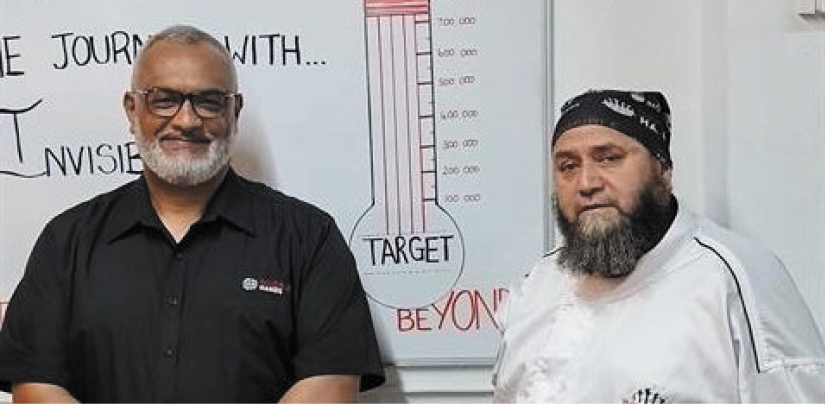
This virus was detected in South Africa in March 2020.
Faieck and Joe Samodien’s Invisible Hands feeding scheme – in partnership with other non-governmental organisations (NGOs) is providing meals to those who lost their jobs due to COVID-19.
The NGOs who have partnered with the feeding scheme are responsible for identifying people that have lost their income due to COVID-19.
The brothers have cooked and delivered over 1.2 million meals since COVID-19 broke out in South Africa.
Even though the feeding scheme primarily help those affected by COVID-19, anyone who needs a meal is assisted.
“We cook the meals in Joe’s garage and, then, have our workers distribute the food,” explains Faieck.
He says other NGOs collect food from Invisible Hands to distribute in their areas of operation.
Faieck says that in December 2021, they reached their milestone of one million people fed.
The brothers receive support and funding from friends, colleagues and businesses.
Their meals – ranging from soups and bredies to rice dishes, are cooked in over 100 pots with a 100-litre capacity. Meals are prepared every weekday and on some Saturdays.
“We started Invisible Hands with the aim of helping the poor years earlier, but when COVID-19 hit, we saw that a lot of people lost their sources of income and we ramped up our operations,” says Faieck.
He adds the demand for their food was high during the Level 5 lockdown in March 2020. “People were losing jobs and businesses were closed. A lot of people ended up relying on our service.”
When he realised the desperate need in the community, Joe retired from his job in the hospitality industry to focus full-time on Invisible Hands. Faieck, who says he too, hopes to join the NPO full time, says that the community has welcomed the food with warmth and appreciation.
Cannabis market offers new possibilities
Cannabis market offers new possibilities LondekileEconomic opportunities in the cannabis sector are opening up as government entities work together to research and exploit business possibilities in the field.
The Gauteng Department of Agriculture and Rural Development (GDARD) and the Gauteng Department of Economic Development recently hosted a webinar exploring how small businesses can exploit opportunities in the cannabis value chain.
The webinar, titled ‘Unlocking the Gauteng Cannabis Economy’, showcased the resources available to Small Medium and Micro Enterprises (SMMEs) that want to venture into the sector.
According to the national Department of Agriculture, Land Reform and Rural Development (DALRRD), the cannabis sector can create between 10 000 and 25 000 jobs. The DALRRD estimates that cannabis can give rise to an industry, valued at an estimated R28 billion.
The Director for Research and Technology Development Services at GDARD, says the webinars help align the work of the department with that of the businesses, so that potential job opportunities can be realised.
“Cannabis is one of Gauteng’s long-term strategic points that we see as a potential booster for our economy.”
Entrepreneurs who run cannabis-related businesses can grow their enterprises by making use of the incubation services offered by the Gauteng Provincial Government’s Innovation Hub.
The Innovation Hub, through its BioPark Business Incubator, which helps grow businesses in the bio-sciences sector, helps SMMEs conduct research into the use of cannabis in medicine.
The Council for Scientific and Industrial Research (CSIR) has also developed quality control standards to which SMMEs entering the cannabis production space will have to adhere.
To make use of the Innovation Hub’s incubation services, entrepreneurs in the cannabis and bio-sciences field can call 012 844 0000, or send an email to info@theinnovationhub.com, or visit www.theinnovationhub.com for more information.
Capturing moments a viable business
Capturing moments a viable business LondekileSelf-taught photographer Mlungisi Busakwe (29) runs a successful photography business in Gqeberha in the Eastern Cape.
In 2015, Busakwe started his company, Book of Ben, and his work got a significant boost when he received R50 000 in funding from the National Youth Development Agency (NYDA).
“The funding came during the 2020 lockdown. I bought the latest equipment and this ensured better quality of the work and allowed me to charge premium prices for my services,” he says.
Busakwe worked hard to master his craft. When he started, he would take pictures of any interesting objects, such as: people and nature. 
Busakwe says being a photographer in the digital era creates a lot of opportunities. His business specialises in capturing special moments such as baby showers, weddings, maternity shoots and parties.
“These celebrations take place very often and the demand for photography has increased. Most people now store photos online,” he says.
Busakwe believes photography has endless opportunities for those with creativity and passion. He advises aspirant photographers to get proper planning and equipment to get started.
Where to start
- Get a good quality camera and learn how to use it;
- Learn how to take pictures of people;
- Learn how to communicate and market yourself;
- Learn what type of photographer you would like to be.
Busakwe says, while social media and websites are primary platforms to market a business, word of mouth still brings in many clients, which requires a photographer to be professional at all times.
“People take you seriously when you take yourself and your business seriously. That will market your business in ways you never imagined,” he says.
Busakwe advises aspirant photographers to research prices of competitors and then use that as their benchmark for their own prices.
NYDA has funding opportunities for people below the age of 35. For more information about the NYDA’s, visit www.nyda.gov.za or call 087 158 6345.
Celebrating the life of Archbishop Tutu
Celebrating the life of Archbishop Tutu UrsulaTributes poured in from across the world to celebrate global icon Archbishop Emeritus Desmond Mpilo Tutu’s life, following his recent passing at the age of 90. 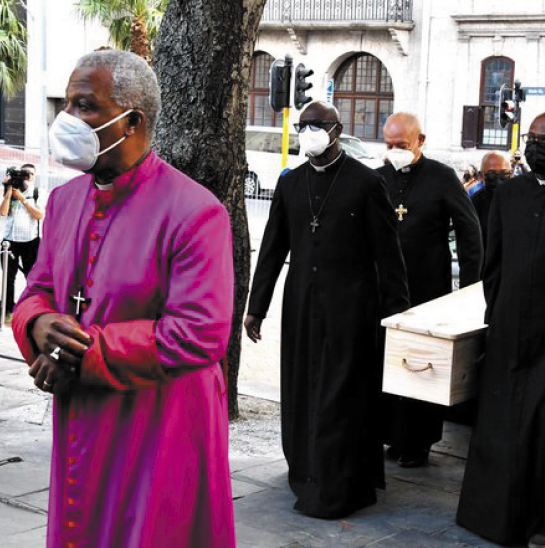
The spiritual leader, anti-apartheid activist and human rights campaigner dedicated his life to the cause of freedom.
President Cyril Ramaphosa described Archbishop Tutu as “a humble and brave human being who spoke up for the oppressed, the downtrodden and the suffering." The President delivered the eulogy at Archbishop Tutu's funeral, which was declared a Special Official Funeral - Category 1.
“How fitting is it that his parents named him Mpilo, meaning life. In his life, he enriched the lives of all he met and all those who got to know him,” said President Ramaphosa.
Democracy and human rights
Archbishop Tutu’s advocacy ranged widely, beginning with appeals for sanctions against apartheid and continuing with campaigns against homophobia, for gender equality and against child marriage, said President Ramaphosa.
It was in 1976, from the pulpit of St Mary’s Cathedral, that he began to speak out against apartheid.
He penned a letter to apartheid Prime Minister Balthazar Johannes Vorster warning him about imminent turmoil due to the desperate conditions South Africans were facing. A few weeks later, the Soweto uprisings occurred.
In the 1980s, he began lobbying for sanctions overseas and was instrumental in persuading the Canadian and French prime ministers, and the United States Congress, to impose them. He also led packed church services in Soweto in protest against the white racist rule in South Africa and, in 1989, led an anti-apartheid march with an estimated 30 000 participants in Cape Town.
Also an HIV/AIDS activist, Archbishop Tutu co-chaired the UNAIDS Commission (2011); supported the ordination of women as priests, the ordination of gay and lesbian priests and the blessing of same-sex unions.
He was a Lesbian, Gay, Bisexual, Transgender, Queer, Intersex, Asexual (LGBTQIA+) ally and campaigned for equal rights for the community and for the community to be recognised by the Anglican church.
Through the Desmond Tutu HIV Foundation, Archbishop Tutu was involved in the treatment and care of people living with HIV and AIDS, the provision of healthcare services to adolescents and the empowerment of young women.
A man of many accolades
Archbishop Tutu received many accolades in this lifetime. He was the second African to receive the Nobel Peace Prize (1984).
He also received the Albert Schweitzer Prize for Humanitarianism (1986); Sydney Peace Prize (1999); Gandhi Peace Prize (2007); Fullbright Prize (2008); United States Presidential Medal of Freedom (2009) and the Templeton Prize in 2013.
Born in Klerksdorp in the North West on 7 October 1931, Archbishop Tutu married Nomalizo Leah Shenxane in 1955.
Once admitted as a sub-deacon in 1958, he enrolled at St Peter’s Theological College in Rosettenville. He was made deacon in December 1960 at St Mary’s Cathedral in Johannesburg and was ordained as a priest in December 1961.
In 1975, he became the first black Anglican Dean of Johannesburg and the Rector of St Mary’s Cathedral and he became a bishop in 1976.
In 1986, after having served as bishop of Johannesburg for 18 months, he took on the role of bishop of Cape Town, and became the first black person to lead the Anglican Church of the Province of Southern Africa. He was also president of the All Africa Conference of Churches. In 1988, he was appointed as the chancellor of the University of the Western Cape.
At former President Nelson Mandela’s request, he then became the chairman of the Truth and Reconciliation Commission (TRC).
“He led the TRC process, and he did so with integrity, dignity and humility. While our beloved Madiba was the father of our democracy, Archbishop Tutu was the spiritual father of our new nation,” said President Ramaphosa.
A man of faith
Archbishop Tutu was a man with a faith as deep as it was abiding, the President said.
“He was not content to decry apartheid at conferences or benefit concerts or international fora. He was there, with the freedom fighters, confronting the regime and comforting its victims.”
The President added that he was with the homeless, the helpless, the persecuted, the sick and the destitute in the streets, in shelters and in homes.
“The most fitting tribute we can pay to him, whoever and wherever we are, is to take up the cause of social justice for which he tirelessly campaigned,” the President said.
Children's book sows love of agriculture
Children's book sows love of agriculture LondekileA Gauteng woman’s love for nature led her to write children’s book titled Tshimong ya Meroho le Naledi, which, in turn, prompted her and her husband to buy a farm and create a space to teach children about agriculture.
Inspired by her own children, the author Manti Maifadi’s primary intention was to see children understanding the importance of growing their own vegetables.
The book is written in Sesotho and accompanied by colourful illustrations. The book’s storyline is set in a vegetable garden and teaches children the principles of self-sufficiency, oneness with all of creation and love for self, the environment and humanity.
Through the character of Naledi, a two-year old boy, Manti captures family values, encourages children to be more aware of their environment, to have fun in the sun and to adopt healthier eating habits
Manti and her husband Samuel Maifadi had to learn about the world of publishing and distributing books very quickly, as they self-published their book.
She adds that the establishment of Naledi Farm in Laezonia, just outside Centurion in Gauteng, was inspired by the book. It provides a physical space to demonstrate the principles of nature discussed in the book, says Manti.
Anyone can visit Naledi Farm but guests need to book first.
She also says the book was also a contribution to society by introducing children to a different way of learning about the environment.
“We believe that if we instil in children kindness and respect for nature, healthy eating habits and a love of using their hands, children will be nurturing, responsible, innovative and confident individuals,” explains Manti.
Apart from encouraging children to develop interest in gardening, Manti says the book is her contribution to the sustainability and enduring use of indigenous African languages. She intends to translate the book into other African languages.
Tshimong ya Meroho le Naledi is sold at R150 per copy.
For more information about purchasing Tshimong ya Meroho le Naledi and to make a booking to visit Naledi Farm, send an email to bookings@naledifarm.co.za
You can also search ‘Naledi Farm’ on Facebook and Instagram.
Educator assistants lend a helping hand
Educator assistants lend a helping hand UrsulaMnqobi Mkhize (31), from Ntuzuma in KwaZulu-Natal, is helping children rediscover the importance of reading, thanks to his role as an educator assistant. 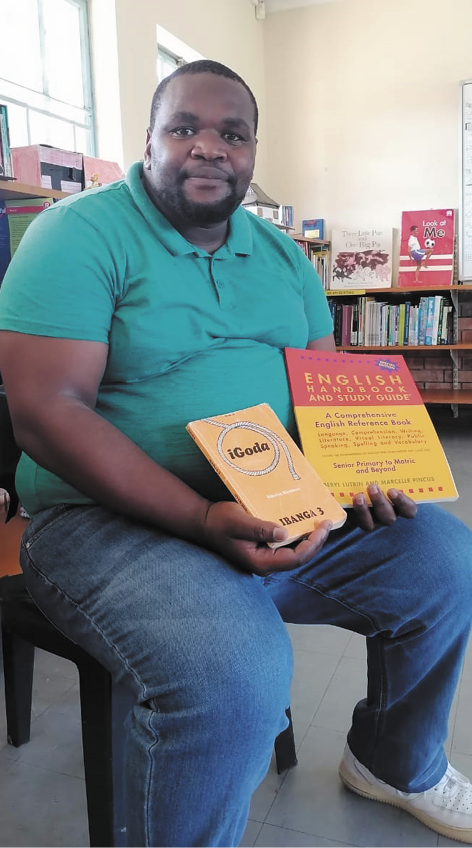
Mkhize is one of 300 000 young people employed as part of the Presidential Youth Employment Initiative, which is one of the biggest public employment programmes South Africa has seen.
The initiative forms part of government’s employment stimulus package, which has contributed to the creation of at least 580 000 employment opportunities.
Head of Project Management in The Presidency, Rudi Dicks, says 22 000 schools across South Africa – in every community – now have educator assistants.
Mkhize, who holds a Bachelor of Technology in Language Practice from Durban University of Technology, had been looking for a job since completing his qualification in 2017.
“I applied for the educator assistant position through the SAYouth.mobi platform in October 2021, as I constantly checked for opportunities on the platform. After I passed the interview, I was allocated to a school in my area as a reading champion,” says Mkhize.
He was appointed on a five-month contract and started at the school – Sondelani Full Service School in Ntuzuma – in November last year.
Mkhize's placement ends in March 2022.
His responsibility is to promote reading and a love of books.
“I have realised that, as a community, we are not doing enough to meet educators halfway when it comes to children’s learning.
In a world that is engulfed by the excessive use of technology, they seldom read books or put effort into their studies. We have a responsibility to educate them about the importance of reading,” he says.
Mkhize is excited to be working with young people and to have a hand in helping shape their future.
He says he has been inspired to study towards a postgraduate qualification in education, which will make him a qualified teacher.
To apply for educator assistant positions, visit the DBE's website (www.dbe.gov.za) and the www.sayouth.mobi.
Free training and services for businesses
Free training and services for businesses UrsulaThree government entities are firmly focused on enabling the ease of doing business in South Africa to grow the economy. 
A recent VukTalks webinar, hosted by Government Communication and Information System, was held to raise awareness of the mandate, policies and services provided by the Companies and Intellectual Property Commission (CIPC), Companies Tribunal (CT) and the Broad-Based Black Economic Empowerment (B-BBEE) Commission.
These are all entities of the Department of Trade, Industry and Competition.
According to Ofentse Shakung, the CIPC’s Manager of Innovation and Collaboration and Director of E-learning, the CIPC has various functions, including the registration of companies, cooperatives and intellectual property rights (trademarks, patents, designs and copyright).
The CIPC developed its BizPortal platform to offer online company registration and related services to simplify the process of registering a business and adhering to requirements.
BizPortal offers those wanting to start a business a one-stop platform to register a company, register for tax, register a domain name, apply for a B-BBEE certificate, register for the Compensation Fund and Unemployment Insurance Fund, and open a business bank account.
“It’s a paperless process and the company will be registered within 24 hours of submission. We have also added Google business services, which enables companies to host a business profile and static company website on Google for free,” said Shakung.
To make use of these services, visit www.bizportal.gov.za and click on ‘register’ at the top of the page. The portal is easy to navigate and offers step-by-step information on how to register a business.
Free training
The CIPC also recently launched free online training platform Learn-i-Biz to help small, medium and micro enterprise directors and entrepreneurs build their capacity to run successful businesses, while ensuring they comply with the legal requirements.
“The platform is a digital study guide and includes video tutorials and a self-examination for each of the seven modules,” said Shakung.
The modules include training on what a company and a director is, key persons in a company, responsibilities of a director, personal financial interests and conflict of interest, remuneration of directors and distributions and the board of directors.
To register for the training, visit www.elearning@cipc.co.za.
Companies Tribunal
Dr Mohammed Chicktay, the Chairperson of the CT, explained that the entity helps provide a speedy resolution in company disputes, relating to applications and complaints made in terms of the Companies Act No. 71 of 2008.
These include disputes relating to company names, directorship and exemption from establishing social and ethics committees. It also reviews compliance notices issued by the CIPC, relating to time extensions to prepare annual financial statements and convene annual general meetings.
“The CT deals with various applications. During COVID-19, for example, we received many applications for an extension of the date to convene an annual general meeting,” said Chicktay.
Another free service offered by the CT is dispute resolution. A person may refer a matter for resolution by mediation, conciliation or arbitration, as an alternative to going to court. The CT serves as a facilitator between the parties.
“The CT encourages mediation to save jobs, especially during COVID-19, and people should start using it more,” said Chicktay.
B-BBEE Commission
According to Lindiwe Madonsela, the B-BBEE Commission’s Senior Manager Compliance, the entity’s mandate is to oversee, supervise and promote adherence to the B-BBEE Act 46 of 2013.
It also investigates fronting practices; aims to increase knowledge and promote public awareness around B-BBEE, by implementing education and awareness measures; and provides guidance to the public.
Any person who suspects or is aware of a violation of the Act, such as where black people are used as fronts to achieve B-BBEE points, may lodge a complaint with the commission.
For an example, employees in an entity may be aware that the entity is practicing fronting by presenting black people as shareholders or executives, when they are not, Madonsela said.
For more information about the B-BBEE Commission, visit www.bbbeecommission.co.za.
For more information about the services offered by the CT, visit www.companiestribunal.org.za.
Get your booster vaccine
Get your booster vaccine UrsulaIf you are over the age of 18 years and have been fully vaccinated against the Coronavirus Disease (COVID-19), the National Department of Health is encouraging you to get a booster dose. 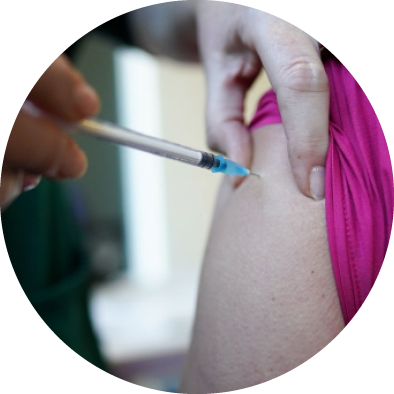
The booster doses provides further protection against COVID-19 in vaccinated people. This is necessary because the effectiveness of the vaccine dose decreases over time.
According to the department, those who received one dose of the Johnson & Johnson (J&J) vaccine will be able to receive a booster dose of the same vaccine two months after the primary dose.
“While it is preferable that you get the booster shot within six months of the primary dose, you can still get the booster dose six months after the first dose,” the department explains.
The department adds that individuals who have a weak immune system and have already received an additional dose of the J&J vaccine will be able to receive a booster dose 60 days after receiving the additional dose.
With regards to the Pfizer vaccine, the department says members of the public who have received two doses of the Pfizer vaccine will be eligible to receive a booster dose of the same vaccine six months after the last vaccine.
You can get the booster dose any time beyond the six months that is recommended.
“Individuals whose immune system is weak and have received an additional dose of the Pfizer vaccine will become eligible to receive a booster dose six months after receiving the additional dose of the Pfizer vaccine,” explains the department.
It added that individuals may only receive the same booster dose as the primary vaccine dose. This means that you cannot get a booster dose of J&J vaccine if you previously received a Pfizer vaccine, and vice versa.
You can visit your nearest vaccination site to get the booster dose.
For more information contact www.sacoronavirus.co.za
Hats off to the Class of 2021
Hats off to the Class of 2021 UrsulaDespite the challenges faced by the matric class of 2021 due to the Coronavirus Disease (COVID-19), they achieved a pass rate of 76.4%, earning the praise of President Cyril Ramaphosa. 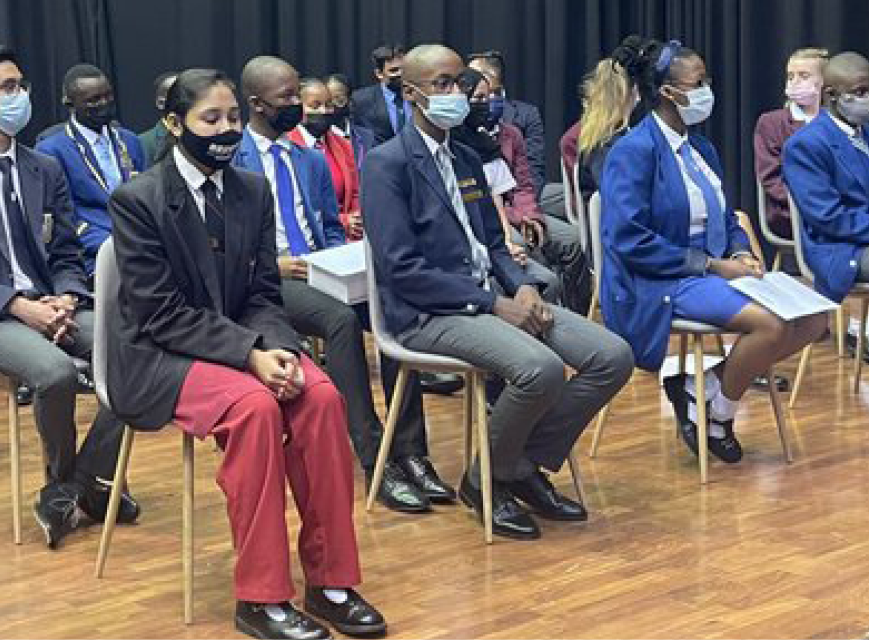
This is an improvement of 0.2% from the pass rate of 76.2% achieved by the class of 2020.
Announcing the results of the National Senior Certificate (NSC) exam results recently, Basic Education Minister Angie Motshekga said 537 687 candidates passed the 2021 NSC exams.
“The number of candidates qualifying for admission to Bachelor studies at universities, is 256 031 – an improvement of 21.4% from 2020. This represents 36.4% of the total number of candidates who wrote the 2021 NSC exams,” the Minister added.
The number of candidates who achieved Diploma passes stood at 177 572, while 103 859 candidates achieved Higher Certificate passes.
“We must state that KwaZulu-Natal and Gauteng contributed the most Bachelor passes in the combined Bachelor passes of 117 704, which is equivalent to 46.0% of the overall Bachelor passes nationally.
“It is important to note that a total of 433 603 candidates – equivalent to 61.6% who achieved Bachelor and Diploma passes, are now eligible for studies at Higher Education Institutions. The 103 859 candidates – equivalent to 14.7% - who obtained Higher Certificate passes, may register at TVET and other skills training institutions,” the Minister added.
She applauded the Class of 2021 for their achievement, saying they were most impacted by the COVID-19 pandemic after enduring two years of harsh exposure to the virus and disruptions.
Minister Motshekga said that for the past 10 years, the NSC pass rates have consistently increased, from 60% in 2009, to above 70% in recent years.
President Ramaphosa also congratulated the Class of 2021 on their success.
“We applaud the multiple successes and improvements recorded by learners during the second year of challenges presented by COVID-19.
“Equally commendable is the support given to learners by educators and parents who made sacrifices of their own and placed the interests of learners ahead of their own concerns,” he said.
SAnews.gov.za
Help for first-time home buyers
Help for first-time home buyers LondekileGovernment is helping make first-time home owners' dreams a reality through its Finance Linked Individual Subsidy Programme (FLISP). The FLISP helps those who qualify to buy a pre-existing home, a serviced residential site, or to build a house on a residential site they already own.
The subsidy programme supplements the bond repayments made by people who earn between R3 501 and R22 000 per month. The subsidy amount ranges from between R27 960 and R121 626. You can also apply for this subsidy if you purchased your first home in the past 12 months, according to the Department of Human Settlements (DHS).
The DHS says the subsidy is intended to assist people who earn too much to qualify for a fully subsidised house, but too little to comfortably afford bond repayments to a bank.
The subsidy can be used to buy a house in a development housing project or on the open market, and will be used to reduce the home loan amount and make the bond repayments affordable.
To qualify, you must be a first-time home buyer, a South African citizen or a permanent resident with a permit. You must be over 18, must have dependants, and must not have previously benefitted from a government housing subsidy scheme.
The National Housing Finance Corporation (NHFC) administers FLISP on behalf of the DHS.
When submitting an application, applicants will need the following documents, among others:
- Proof of home loan or approval in principle;
- Agreement of sale (where applicable);
- Building contract and approved building plan (where applicable);
- South African identity document;
- Identification documents of all occupants;
- A marriage or civil union certificate/final order of divorce/spouse death certificate;
- Recent payslip.
A list of all required documents can be found on the application form.
When buying in a housing development, an applicant must identify a property from the FLISP development projects.
Before the subsidy is ap8proved, the following must be done:
- The buyer needs to sign an offer to buy with the developer;
- The developer will assist the applicant to apply for a home loan with an accredited lender;
- The applicant must complete the FLISP forms with a trained FLISP agent from the property developer.
Applicants can find the FLISP application form on the NHFC website (www.nhfc.co.za), or at their nearest NHFC or DHS office. Call the NHFC call centre at 0860 011 011 to find out about FLISP housing developments projects in all provinces, or send an email to flisp@nhfc.co.za.
Kwanalu grows livelihoods
Kwanalu grows livelihoods LondekileKwaZulu-Natal Agricultural Union (Kwanalu) has kick-started an agricultural development programme called Women and Youth in Rural Entrepreneurship (WYRE).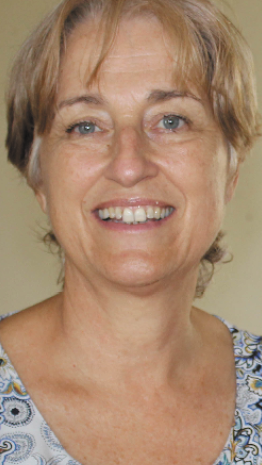
The programme will provide rural women and youth entrepreneurs with skills and opportunities to support themselves and their communities, while participating in the agriculture value chain.
Kwanalu represents the collective interests of KwaZulu-Natal’s (KZN) commercial farmers and those involved in agriculture-related activities in their communities.
The WYRE programme was motivated by its members’ desire to reverse the cycle of poverty.
“From our years of working in the rural sector, we identified that poverty and a lack of skills can only be truly reversed if we commit to a sustained programme that supports people throughout the entire entrepreneurial process,” says Kwanalu’s Chief Executive Officer Sandy La Marque.
She adds that agriculture is a leading sector in South Africa’s economy and Kwanalu has insights into the social challenges youth and women in rural areas face.
The WYRE programme aims to permanently change their circumstances, by upskilling them to take part in the agriculture value chain.
Dr Kathy Hurly, the head of the WYRE programme, says as the programme is outcomes-based, she expects to see real change in communities.
Lihle Dladla, a beneficiary from eMbo near Durban, was running a day care centre but had to close it down when the parents of the children she cared for lost their jobs due to the civil unrest and looting that took place in South Africa in July 2021.
She says the WYRE has taught her so much she is thinking of entering the entrepreneurial space again.
“Kwanalu came to our area and offered to help those in need with business skills and resources. It made an open call, not just for those in agriculture. We have already attended a course that taught us about costing and market investigation,” she says.
Dladla says the intention is to take the skills they are getting from the WYRE programme to the people in their communities, for a wider impact.
Dr Hurly says the next step is the developing and strengthening of entrepreneurs in rural towns in KZN with accredited business training, leadership skills, development in self-management programmes, mentorship training and new venture creation.
“We aim to create 665 businesses in year one, employing 3 325 people and sustaining 33 250 livelihoods, with a value of R166 million in the rural economy,” says Dr Hurly.
To take part in the WYRE programme, visit http://www.kwanalu.co.za/kwanalu-wyre-webinar-survey/ and enter your details or call 033 342 9393.
Locally produced COVID-19 test a hit
Locally produced COVID-19 test a hit UrsulaHealthcare professionals across South Africa, and the rest of Africa, are now able to use a locally developed Coronavirus Disease (COVID-19) test kit. 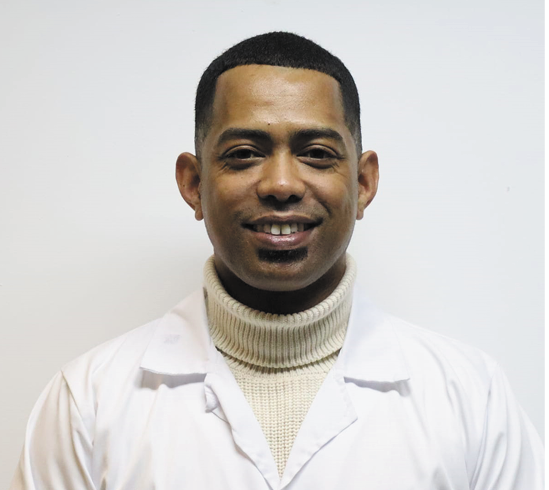
Approved by the South African Health Products Regulatory Authority, the MD SARS-nCOV-2 Antigen Device was developed by Ashley Uys (39) of Belhar in the Western Cape.
Antigen devices (also called ‘rapid diagnostic tests’) detect protein on the surface of the virus. These tests are inexpensive and the results are known within 15 to 30 minutes.
Uys is the founder and Chief Executive Officer of Medical Diagnostech, a company that specialises in developing and manufacturing high-quality rapid diagnostic test kits.
“I graduated with a Bachelor of Science Degree in Biotechnology from the University of the Western Cape, in 2002, and completed my Honours degree in Biotechnology, in 2003,” says Uys.
After completing his internship at the same university, he decided to start Real World Diagnostics (RWD) in 2006. The company distributed rapid medical and drug diagnostic kits – including drug and pregnancy tests – across South Africa.
In 2010, he started Medical Diagnostech and, using money generated from his first company, was able to secure a manufacturing facility, producing diagnostic test kits for HIV, malaria, pregnancy and STIs.
“I started working on the development of the COVID-19 antigen device about 19 months ago,” he says.
Uys adds that the fact that COVID-19 test kits were previously imported from outside Africa made them more expensive and cost African governments a lot of money.
The availability of a local test, he says, presents a cost-effective solution to fighting the virus on the continent. “It also means that we are able to develop our own intellectual property and products as African scientists,” says Uys.
He adds that companies across the country have already placed orders for the device. His company is able to produce 20 million units per year.
“We are in the process of scaling-up production capacity so that we can meet demand,” he says.
Uys is grateful to the South African Medical Research Council, the Department of Science and Innovation, and the Technology Innovation Agency, which provided R2.6 million in funding.
SAMRC Executive Director for Grants Innovation and Production Development Dr Michelle Mulder says this investment has enabled the final product development steps required to deliver an approved test kit.
Medical Diagnostech has 41 employees, which includes six scientists.
Uys says the company is currently developing a home test kit and an application for smartphones to interpret test results.
Mauritius scholarships for South African students
Mauritius scholarships for South African students UrsulaThe government of Mauritius is offering eligible South African students a higher education scholarship. 
Qualifying South African students can apply for the scholarship via the Department of Higher Education and Training by 31 January 2022.
The scholarship covers tuition for full-time study, at both undergraduate and postgraduate levels, at public tertiary institutions in Mauritius. The academic year in Mauritius starts in April 2022.
All applicants must have already applied for at least one full-time, on-campus programme at a tertiary institution of their choice in Mauritius and should offer this proof of application when applying for the scholarship.
The scholarship offers the following:
- Tuition fees and course-related costs of up to MUR 100 000 (approximately R36 000);
- Monthly living allowance to the value of MUR 12 500 (approximately R4 500);
- Free basic health care in public hospitals in Mauritius;
- Return airfare to and from Mauritius.
Successful candidates will have to cover other expenses, such as, additional tuition costs, costs of fieldwork, books and re-sit examination costs.
Applicants must be South African citizens in good health and with a strong academic record.
All applicants must meet the entry criteria for their selected programme in Mauritius and must meet the minimum academic requirement for entry into a similar programme at a South African university.
Candidates must be proficient in English.
Awardees should be vaccinated against COVID-19 and those who are not vaccinated due to medical reasons, will be required to produce certified medical certificates.
Applicants must be prepared to undergo a medical check-up as per the Passport and Immigration Office requirements (http://passport.govmu.org) in Mauritius.
Undergraduate scholarship applicants:
Must have successfully completed a National Senior Certificate with a Bachelor’s pass and a minimum of 60% average mark achieved; excluding Life Orientation.
Applicants should be above 18 years of age and should not have reached their 26th birthday by August 2022.
Master’s scholarship applicants:
- Must have completed an Honour’s degree with a minimum of 60% average mark achieved;
- Applicants should not have reached 35 years of age by 22 August 2022;
- All applicants must submit a detailed study/research plan of about 750 words and a name of a proposed supervisor in Mauritius, where applicable.
PhD scholarship applicants:
- Must already hold a Master’s by research or equivalent degree in the relevant field with a minimum of 60% average mark achieved;
- Applicants should not have reached 40 years of age by 22 August 2022;
- All applicants must submit a detailed study/research plan of about 1 500 words and a name of a proposed supervisor in Mauritius, where applicable.
For any enquiries, E-mail: internationalscholarships@dhet.gov.za or visit https://www.internationalscholarships.dhet.gov.za/
New shelters to support GBV survivors
New shelters to support GBV survivors UrsulaTwelve unoccupied stated-owned properties have been made available to provide shelter and services to survivors of Gender-Based Violence (GBV) in Gauteng and the Western Cape. 
This follows the commitment made by the Minister of Public Works and Infrastructure, Patricia de Lille, in 2019, when she told the joint sitting of the National Assembly that the department would allocate unoccupied state-owned properties to provide shelter to survivors of GBV.
“Six of these shelters are in Gauteng and the other six are in the Western Cape,” says the Minister.
According to the department, the properties were unoccupied, because they were no longer required for government purposes.
“The properties required medium to extensive refurbishments, which were completed by the department before being handed over to the provincial departments of Social Development,” the department says.
The Department of Social Development (DSD) says most of these shelters can accommodate six to 10 people.
“Some of these shelters operate as white-door safe spaces, which accommodate survivors for 72 hours. Others operate as victim empowerment shelters and Khuseleka One-stop Centres, which can both accommodate survivors for three to six months,” says DSD.
In these shelters, a qualified social worker assists survivors, who receive individual and group counselling, as well as couples therapy, where appropriate. Access to the police, legal aid and courts, and health services are also facilitated.
How to find help
Since shelter information cannot be widely publicised to ensure the safety of survivors, to find out how to access the shelters, you must visit your nearest Social Development office, or contact the GBV Command Centre (GBVCC), or the South African Police Service (SAPS).
You can also contact the GBVCC, toll-free, at 0800 428 428. Alternatively, send a ‘please call me’ by dialling *120* 7867#, or SMS ‘help’ to 31531.
Members of the deaf community can also contact the centre via Skype: Helpme GBV.
For more information, visit www.gbv.org.za.
PETCO helps turn plastic waste into profit
PETCO helps turn plastic waste into profit LondekileIf you want to make money from waste and need expert advice or to connect with other waste collectors, PET Recycling Company (PETCO) is your go-to place.
The not-for-profit company represents the South African plastic industry’s efforts to have people manage polyethylene terephthalate (PET) waste, such as used plastic cooldrink bottles. The organisation operates throughout the country.
Spokesperson Junaid Francis says recycling stimulates the local economy and creates value in waste, which was previously not considered to have value.
He adds that recycling provides jobs and livelihoods for people, especially the most destitute members of society.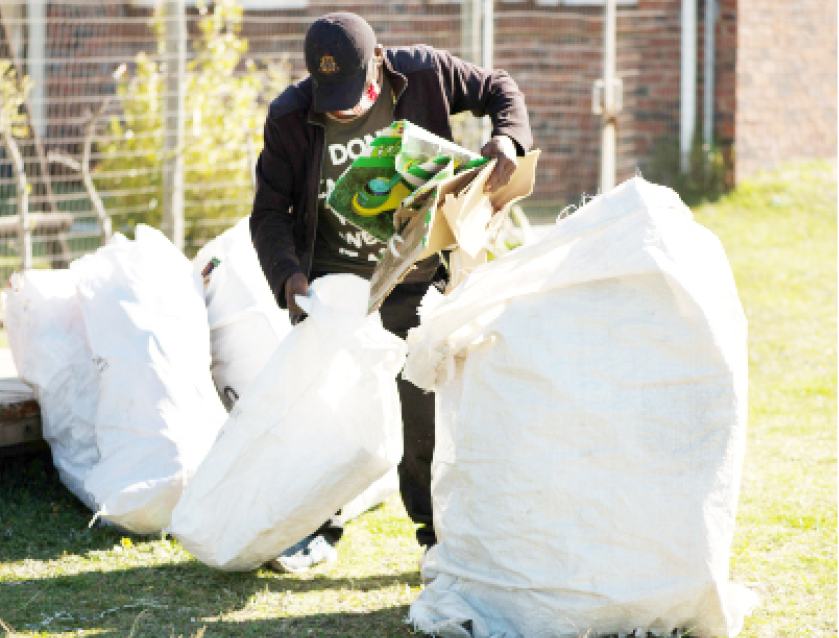
PETCO supports recycling initiatives and activities, and these need not be at a large scale.
“Waste collectors do not have to be a member of PETCO in order to start recycling or apply for sponsorship of equipment and protective clothing, or to be able to attend training,” says Francis.
How to start recycling
You can also start recycling in your own home. “Plastic bottles are not trash. When recyclable materials, like PET, are sent to a landfill, they become completely useless. Keep them out of the waste stream by recycling them. Check for local organisations, schools and shopping centres that offer recycling,” he says.
You can start by getting storage bins for your home.
“Once you learn which materials your local drop-off centre accepts, set up a corresponding storage bin system. The garage, or your kitchen, is a good place to locate the bins,” says Francis.
Recently, PETCO launched a WhatsApp platform (060 070 2077) that provides responses to key questions around collection.
For more information contact Petco at 021 794 6300 (Cape Town), or 011 615 8875 (Johannesburg), or visit www.petco.co.za.
Rabies can be prevented by vaccination
Rabies can be prevented by vaccination LondekileMost human rabies cases are caused by bites or scratches from an infected animal, which are vulnerable to infection if they have not been fully vaccinated against the disease.
According to the National Institute for Communicable Diseases (NICD), rabies is a fatal viral disease reported in wild and domestic animals, but most cases of rabies in South Africa involve domestic dogs.
The rabies virus is spread to humans and other animals through contact with infected saliva, through bites or scratches. The disease attacks the brain. 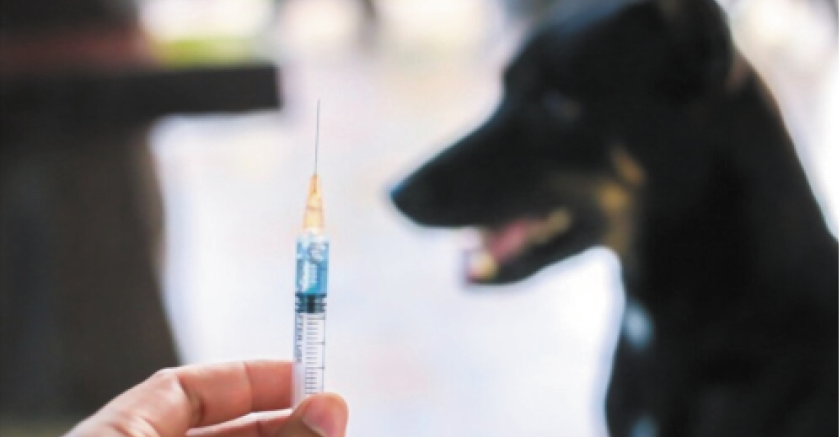
While human rabies cases are rare in South Africa, the NICD says there was an increase in cases in 2021, compared with previous years.
“In 2021, 17 laboratory-confirmed human rabies cases were reported in the country. This is an increase from eight cases reported in 2020 and 10 in 2019. The increase is due to outbreaks of rabies in domestic dogs,” it says.
According to the latest statistics provided by the World Health Organisation, rabies is estimated to cause 59 000 human deaths annually in over 150 countries, with 95% of cases occurring in Africa and Asia.
How to prevent rabies
The NICD says rabies can be prevented by vaccinating dogs and cats.
This is the best available measure to prevent infection and interrupt outbreaks, it adds.
“If any animal is suspected to be infected – for example, animals that display unusual behaviour, hyper-salivation or signs of paralysis – contact your local or state vet to investigate,” the NICD says.
Do not approach or handle animals you don’t know, as they may not have been vaccinated.
Preventing human rabies
If you have been bitten or scratched by an infected animal, wash all wounds thoroughly with soap and water. Then, urgently go to a doctor or your closest healthcare facility and ask for the rabies post-exposure prophylaxis.
“Rabies post-exposure prophylaxis is considered a life-saving emergency intervention following possible rabies virus exposure. It entails thorough cleaning of the wound, rabies vaccination and rabies immunoglobulin therapy,” the NICD says.
For more information about rabies, visit www.nicd.ac.za/diseases-a-z-index/rabies/
Report anti-competitive conduct
Report anti-competitive conduct LondekileWhen there is lack of competition in the economy and only a few players dominate markets, it becomes almost impossible for South Africa to realise inclusive economic growth.
This is why Commissioner Tembinkosi Bonakele of the Competition Commission of South Africa believes that the country needs a more competitive economy to realise growth and job creation.
“When markets are dominated by few players, and there are market failures and barriers to entry for small players, consumers and producers are the ones who feel the pinch,” says Bonakele. 
For example, mobile operators Vodacom, MTN and Cell C started reducing their mobile data prices in 2020 after the Competition Commission’s report on the data services market inquiry in 2019.
The report found that MTN and Vodacom charged excessive prices for data. They were compelled to independently reach an agreement with the Competition Commission or face prosecution by the Competition Tribunal.
The Competition Commission investigates and prosecutes prohibited and anti-competitive conduct and aims to provide consumers with competitive prices and product choices.
“We have to ensure that small- and medium-sized enterprises have an equal opportunity to participate in the economy and to increase the ownership stakes of historically disadvantaged persons,” says Bonakele.
How to lodge a complaint
Anyone can lodge a complaint with the Competition Commission. According to the Commission, people can lodge complaints when certain companies make it impossible for other companies to get business, gain access to markets or to compete. People can also lodge a complaint if companies are unfairly hiking prices. Visit www.compcom.co.za/lodge-a-complaint and complete and submit a complaint form.
The following information must be submitted:
- Name of complainant;
- Name of the party being complained about;
- A brief description of the conduct giving rise to the complaint;
- State whether the conduct is still continuing or if not, the date on which the conduct ceased;
- Provide a written submission setting out, in detail, the complainant’s cause for the complaint, how it arose, the parties involved, relevant dates and any other relevant information;
- Provide your contactable details – postal address, telephone number and email address.
An inspector from the commission will investigate the complaint.
To lodge a complaint, call 012 394 3200 or email ccsa@compcom.co.za.
Sambulo Xulu connects KZN village to the internet
Sambulo Xulu connects KZN village to the internet LondekileMany people in rural areas lack reliable internet services, making internet cafés profitable businesses if placed in the correct location.
This is the view of Sambulo Xulu (25) from KwaMaphumulo, in KwaZulu-Natal, who runs Gayezi Internet Café in this rural community.
After seeing the gap in the market, Xulu registered his internet café business in October 2019. Shortly after that, Xulu enrolled in a business training programme run by the National Youth Development Agency (NYDA).
“I gained valuable business skills thanks to the training and I had a solid plan. I applied for funding at the NYDA and, when I received the grant, I bought a container. I run my business using laptops that customers use to surf on the internet,” he says.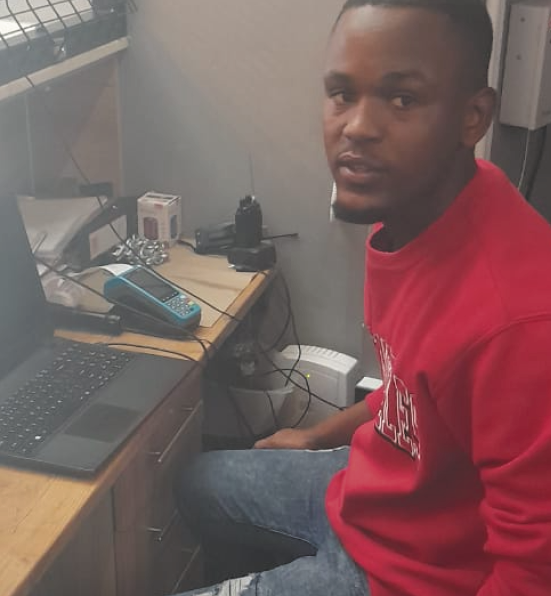
Gayezi Internet Café offers services such as scanning, photocopying, emailing, assisting with company registration, typing, laminating, and helps students with applications for higher education institutions.
Xulu says doing market research is important for one’s business to attract customers and make profit.
Before opening his internet café, Xulu saw people from around his community travelling to the nearest town to get the services that he now offers.
“I target students, teachers, and job seekers. The internet café is strategically located on the main road,” he explains.
Xulu says, even though nowadays almost everyone has a smartphone, many people still struggle with data.
Furthermore, some areas have poor reception, and some users do not have the necessary applications on their phones and so they need a facility like an internet café to work.
Xulu’s main challenge is a decline of customers during the festive season when no one is at school or work. His customer base usually increases in January when schools reopen and when jobseekers start to look for work.
“As much as my business is on the main road, there is potential for more clients if it can be located near a police station where many people go to certify documents. I am planning to make that move,” he says.
For more information on NYDA funding, contact the NYDA at 087 158 6345/ 5738 or email: info@nyda.gov.za
TVET college grooms farmer for success
TVET college grooms farmer for success LondekileKhodani Maano (22) realised from an early age that he had a passion for farming. He persuaded his parents to send him to a Technical and Vocational Education and Training (TVET) college to study primary agriculture.
Today, Maano is a garlic farmer and is also a student at Mashamba TVET College.
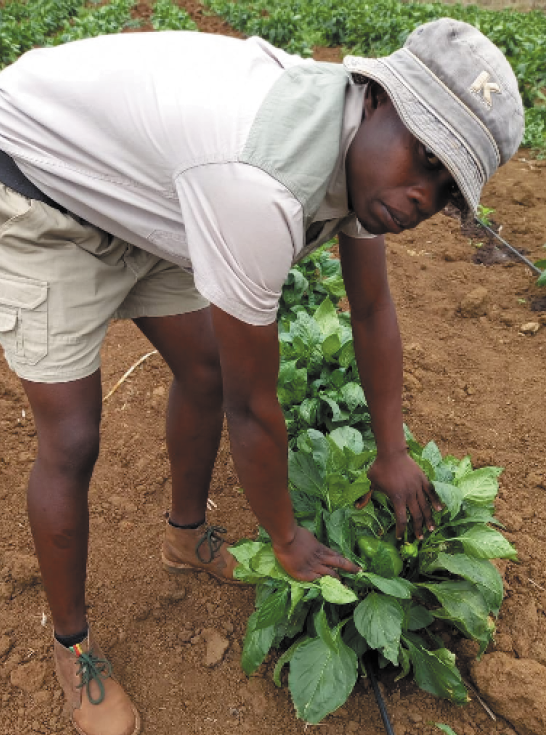 Maano, from Divhane village in Limpopo, dropped out of Grade 11 in 2019, and although his farming enterprise is flourishing, he says the practical training he’s receiving while studying towards a National Certificate: Vocational NC(V) in Primary Agriculture has given him a better understanding of the work he does.
Maano, from Divhane village in Limpopo, dropped out of Grade 11 in 2019, and although his farming enterprise is flourishing, he says the practical training he’s receiving while studying towards a National Certificate: Vocational NC(V) in Primary Agriculture has given him a better understanding of the work he does.
Apart from producing garlic on his leased four-hectare plot, Maano also harvests butternut, maize, beetroot, sugar beans, green beans and onions.
“When I went to the TVET college, I was already used to working the land and taking from what my mother and father taught me at an early age. However, being in a formal farming programme is invaluable. I thought I knew a lot, but am realising there’s a lot about farming I had not paid attention to,” says Maano.
He adds that when he left school, his parents were not happy, but they understood that he was more of an agricultural person.
“I did not like other trades or businesses. Being at a TVET college has shown me that I was not less intelligent, I just had to find something relevant and practical,” he says.
Maano chose garlic because not a lot of people grow it.
He employs three people and his goal is to expand production. “I want my own large portion of land and to employ more workers. I want to put my village on the map,” he says.
What is an NC(V) programme?
According to the South African Qualifications Authority, NC(V) programmes equip learners with practical skills, applied competence and the knowledge required for employment in a particular occupation or trade.
Each TVET college has its own admission dates. Visit your local TVET college’s website to enquire about its NC(V) programmes.
Theatre a hub for creative excellence
Theatre a hub for creative excellence LondekileThe official opening of the Northern Cape Theatre in Kimberley will provide new opportunities for local artists after years of uncertainty.
This is according to Minister of Sport, Arts and Culture Nathi Mthethwa.
"This institution should polish the talent in this province and place it on a pedestal for the world to see," says Minister Mthethwa.
Previously closed down due to its dilapidated state, the theatre recently underwent a R12 million refurbishment.
During the recent opening of the theatre, Minister Mthethwa said the Coronavirus Disease (COVID-19) pandemic had made it hard to stage productions. Thanks to the refurbished theatre, creatives will be able to perform on home soil and will no longer be forced to travel to Gauteng, the Western Cape or the Free State.
“My ongoing mission is that each and every province must have at least one key performing arts space that will be a beacon to support all efforts in that province," he added.
Local is lekker
Northern Cape-born actor, playwright and director Moagi Modise believes the official opening of the theatre can only lead to great things for the local industry.
“We are looking at producing an array of indigenous productions. We need to restore the pride of our province through arts and crafts, our stories will be told and depicted."
The Galeshewe Arts and Theatre Organisation, which had a dance piece showcased during the launch, also expressed excitement at the official opening.
“It is time the people of the Northern Cape have a space that they can utilise to tell their own stories through different productions,” said the group leader, Phemelo Sediti.
Minister Mthethwa encouraged creatives to not only focus on enhancing their creative skills, but also the business side of their craft.
To assist creatives, the department is also investing in its Incubator and Skills Development Programme.
“My department has also committed to an initial investment of R1.5 million towards the Incubator and Skills Development Programme – which will involve the development of skills in theatre, dance, music, marketing and administration,” he said.
Top cop helps put rapists behind bars
Top cop helps put rapists behind bars UrsulaSergeant Ishmael Matjeka (36), of the Serial and Electronic Crime Investigations (SECI) unit in Limpopo, has made a name for himself for helping put serial rapists behind bars. 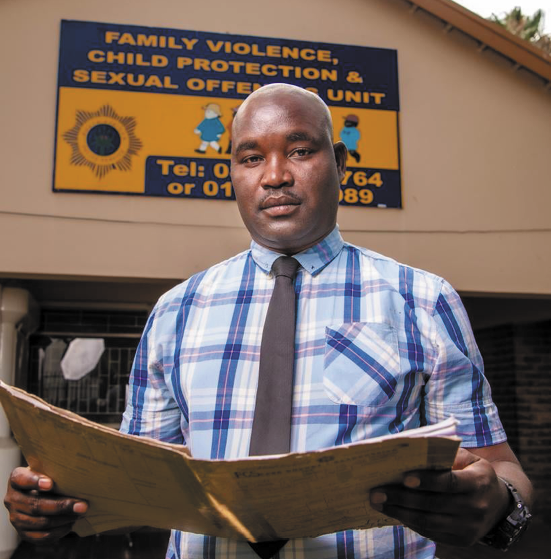
Matjeka collects evidence, interviews witnesses, follows up on any information related to the cases he is working on. He also submits a report that the prosecutor will need to find rapists and often himself testifies in court during
The SECI is a provincial policing unit that falls under the Family Violence, Child Protection and Sexual Offences (FCS) unit of the South African Police Service.
Matjeka has been a police officer for 11 years. He has helped put at least 19 serial rapists behind bars for life. The first one was during his time at the Groblersdal SAPS’s FCS unit. The other 18 convictions were during his time at the SECI.
He has done this by using DNA, forensic evidence and by putting together thorough reports for the prosecutors.
DNA, which is found in the body, carries all the information about how a living thing will look and function.
“Every time a victim comes to report a rape, the lab collects DNA samples, which it puts on file. If the DNA is identical to other samples they have on file, then it is known that a serial rapist is operating in the area. Once the lab notices this pattern, the case is passed on to us at the SECI.”
Matjeka is currently working on 39 cases related to gender-based violence (GBV).
What to do if you are raped
Matjeka advises a rape survivor to immediately go to the nearest police station to report rape. He says that the person must not take a bath, which might destroy DNA evidence. In addition, they must take along the clothes they were wearing, because these too can provide crucial evidence.
He says rape survivors should be given priority at police stations and will be assisted by an officer trained in assisting GBV survivors.
If a victim is able to give a statement before receiving medical treatment, this will be done before the victim is taken to hospital by the police, for a doctor’s examination.
The evidence collected during the examination is put in the sexual assault evidence collection kit, to be tested and analysed at a lab, says Matjeka.
He urges the police and community to work together to solve GBV cases.
“I urge men and women to not only speak out, but act, against GBV by reporting it to the police before lives are lost,” says Matjeka.
To report a rape, call 10111, or visit your nearest police station.
Work together to strengthen democracy
Work together to strengthen democracy UrsulaFrom the Union Buildings

On the first day of 2022, the nation gathered in spirit to bid farewell to Archbishop Desmond Tutu at St George’s Cathedral in Cape Town.
It was a moment of great sadness as we recalled the life and contribution of a beloved compatriot who was, in many ways, the moral conscience of our nation.
At the same time, his funeral was a celebration of the values he stood for. It was a celebration of the great unity and diversity of our people, and a reminder of the sacrifices made by so many to achieve our democracy.
On the second day of 2022, the country watched on in horror as a huge fire engulfed our Parliament, just a hundred metres from where we had gathered the day before to pay our last respects to Archbishop Tutu.
We are relieved that there was no loss of life and that no-one was injured in the fire. We are extremely grateful to the firefighters who battled the blaze and finally extinguished it.
The investigations into the cause of the fire are now underway. We need to ensure that these investigations are thorough and concluded without delay. The country needs to know what happened.
Arrangements are being made to ensure that the work of Parliament can continue even if the buildings cannot be used.
It is vital that Parliament continues to consider and pass laws that will transform society and continues to provide oversight and ensure accountability as government works to implement the mandate it received from the people.
Apart from the close proximity of St George’s Cathedral and Parliament, what connects these two events is that each reminds us of what brings us together as South Africans: our democracy.
We mourn Desmond Tutu because he was the spiritual father of our democracy.
We despair at the devastation of our Parliamentary buildings because they are the seat of our democracy. They are the place where our new democratic Constitution was adopted just over 25 years ago, and where hundreds of transformative laws have been passed.
We may not always recognise it, but the fire at Parliament demonstrated how strongly South Africans feel about their democracy. It is a reminder also of how important it is that we work to strengthen and defend that democracy.
While the Parliamentary buildings have been damaged beyond use, the institution of Parliament continues its work in the service of the people.
This is an important reminder that our democratic institutions are not defined by the buildings that house them, but by the work they do and by the confidence that the people have in them.
This is true of all the institutions of our democracy.
Just as the fire in Parliament was finally being extinguished, Acting Chief Justice Raymond Zondo submitted the first part of the report of the Commission of Inquiry into State Capture.
This part of the report details how several public institutions were infiltrated, looted and severely damaged. These include state-owned enterprises like South African Airways, the Government Communication and Information System and the South African Revenue Service.
This part of the report paints a deeply disturbing picture of how key institutions of our democracy were compromised and undermined with criminal intent.
Not only were significant amounts of money stolen, but these institutions were not able to properly fulfil the functions for which they were established.
The findings and recommendations of the Zondo Commission will help the country to rebuild these institutions and to hold those responsible to account. We must ensure that we use them to safeguard these institutions into the future so that they may never be captured again.
We must safeguard against any and all efforts to diminish our hard-won democracy – whether these efforts take the form of corruption in state-owned enterprises, the subversion of our law enforcement agencies, the sabotage of our economic infrastructure, or attacks on the independence and integrity of our judiciary.
We need to protect our Constitution, our democratic state and the electoral process from anyone who wants to weaken our democracy and deny the South African people of their hard-won freedom.
There are many challenges that we must confront as we work to rebuild and recover from the effects of the COVID-19 pandemic.
As we do so, let us draw strength and encouragement from our deep dedication to our democracy and our common desire to build a nation that is united, free and equal.
I wish you all the best for the year ahead.